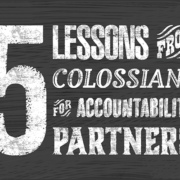5 Lessons From Colossians For Accountability Partners
I invite you to open up your Bible to Colossians 2:20–3:17 and take a few minutes to meditate on Paul’s words. If you have an accountability partner or you are an accountability partner, you may want to study this section of Scripture together the next time you meet. If you don’t already have the habit of reading the Bible together regularly, this little exercise can be a good first step.
A little background: Paul wrote this letter to a church he had not planted which was located in Asia Minor, which is modern day Turkey. Epaphras, one of the church leaders, had visited Paul in Rome because the Colossians Christians were apparently under attack from a false teaching that wanted to add to Jesus’ work. The implications of the false doctrine were that Jesus was not enough and the Colossians ended to do more. So, throughout the letter, Paul responded by presenting Jesus as the One who is above all and completely sufficient. Jesus is the best. You don’t need anything more. In this final section of the letter, Paul focuses on actions the Colossians Christians could pursue, but he never leaves the gospel far behind. Its motivation continues even into the application.
Please read Colossians 2:20–3:17 with this question in mind: What words, truths, and phrases would be good to remember when encouraging someone in their Christian life? Write them down. There are a lot! How do they change or strengthen the way you want to help people, especially your accountability partner?
Here are 5 points you may want to highlight:
1. Mere rules don’t deeply change the heart.
Paul writes, “Such regulations indeed have an appearance of wisdom, with their self-imposed worship, their false humility and their harsh treatment of the body, but they lack any value in restraining sensual indulgence.” In conversations with ourselves or with others, we are tempted to jump to making lists of rules. We want to rely on the law. The law even excites us because what it offers seems within our reach. But Paul says, “They lack any value in restraining sensual indulgence.” If we want true change, we must start with the heart.
2. We are connected to Christ.
We have died and have been raised with Christ. Our life is now hidden within him. This reality is the heart change that we needed. Christ needs to remain the central element of our conversations about sin and forgiveness AND in our lives of gratitude. We don’t graduate from needing Christ. We grow deeper in him.
3. Death is painful and essential.
Paul shares a list of sins we struggle with and tells us to put them to death. He doesn’t say, “Put them aside for a while.” He doesn’t say, “Wean yourselves off these vices.” He says, “Put to death, therefore, whatever belongs to your earthly nature.” And death is painful. These lusts, greed, immoralities, and evil desires don’t want to leave! They are happy where they are and want to take more control. Paul says, “Put them to death.”
4. Fill your heart with meaningful things.
Compassion, kindness, humility, gentleness, patience, forgiveness, and love are the good things God wants us to clothe ourselves with. We don’t just want to rid ourselves of the evil; we want God’s good virtues to take their place. We strive toward these virtues. How does each one look in your life?
5. Let the word of Christ dwell in you richly.
God’s word keeps us connected to him as we live and encourage those around us. It is not fluff. God’s word is meant for our lives, no matter how tough they are. If we need admonishment, it is there. If we need forgiveness, it is there. If we need teaching, it is there. Let the word of Christ dwell in you richly.
Author: Nathan Schulte serves as a missionary in WELS missions in Latin America. He lives in Quito, Ecuador.






